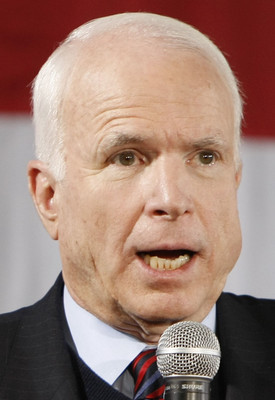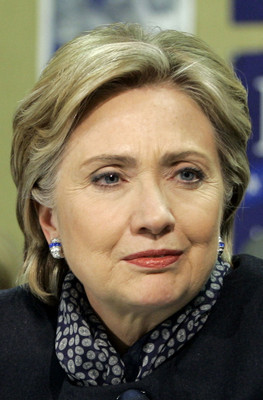All factions make case for victory
If you ask Nevada Democrats, Republicans are in trouble in November.
Seeing historic numbers and enthusiasm in their favor, both nationally and in the state, the Democrats are practically preparing the ticker tape right now.
The almost certain Republican presidential nominee, John McCain, is in favor of the proposed nuclear waste repository at Yucca Mountain and not popular with the party's conservative base, they note.
But to the Republicans, it's the Democrats who have treacherous waters to navigate.
They point out that presidential candidates Barack Obama and Hillary Clinton remain locked in a bitter and exhausting battle, potentially sowing permanent divisions and giving the GOP a head start on coming together.
"If it (the Democratic race) goes on and on, that benefits the Republicans," said Republican Clark County Commissioner Bruce Woodbury, an early McCain supporter. "The longer it goes on, the more likely there will be division."
It may be true, Woodbury said, that Democrats have an edge in voter enthusiasm this year, but presidential elections are about the candidates.
"If Hillary Clinton is nominated, that's going to energize Republicans," he said. "And once the novelty of Senator Obama wears off and he has to go face to face on all these issues, the same thing will occur there."
But Assemblyman Tick Segerblom, D-Las Vegas, rejected the idea that the Democrats are in for a protracted fight.
"She's a dead man walking," Segerblom said of Clinton. The legislator and longtime party activist campaigned for John Edwards until he dropped out last month; Segerblom now supports Obama.
"Something could happen to him, but barring that, the numbers are there, the sentiment is there," Segerblom said of Obama. He predicted Clinton would drop out after next month's Ohio and Texas primaries.
The Democratic race took a vicious turn in the run up to the Jan. 19 Nevada caucuses, with powerful Democratic interests in the state pitted against each other. The Culinary union, jumping late on the Obama wagon, aired attack ads against Clinton, while the Clinton campaign, backed by most of the Democratic establishment, was supportive of a lawsuit against the Nevada Democratic Party that challenged workers' right to caucus on the Strip.
In the end, Clinton won the majority of precinct delegates here, but Obama could get more of the state's national convention delegates because he performed well in rural and Northern Nevada, a confusing and conflicted result that serves as a good metaphor for the Democratic caucuses.
Segerblom, however, said the conflicts on the surface didn't reflect the mood of the rank and file.
"Everybody I've talked to says, 'I like Hillary, but Obama's great, too,' or vice versa," he said. "I know there was bitterness in the caucus between institutional forces, but on the whole, it's insignificant."
Assemblyman Ruben Kihuen, D-Las Vegas, a major Clinton supporter, disputed the notion that his candidate was dead in the water, but agreed that there would eventually be party unity.
"I firmly believe that we can come together," he said. "I, myself made a promise since before I endorsed, to Obama, to Edwards and all the other candidates, that whoever ended up getting the nomination I would endorse and personally support and go out and actively campaign for them. If Senator Clinton gets the nomination, I would hope the leaders of the other campaigns get on board with the same cause, which is winning the general election."
Kihuen noted that before he endorsed, he helped lure all the candidates to his Assembly district to campaign, something his constituents appreciated. And he said that while Clinton and Obama supporters have strong feelings about their candidates, they don't differ widely on the issues, whereas many Republicans differ with some of McCain's basic stances.
An original Obama supporter, state Sen. Steven Horsford said Obama's increasingly large margins of victory in recent contests showed a party gravitating toward him, and argued that the huge overall Democratic turnout in the primaries was a good sign for the ticket.
"There has been a reflection of the amount of energy and overall momentum and galvanized support there is out there, not just for Barack Obama, but for Democrats in general," he said. He argued that the drawn-out nature of the Democratic race could even be a plus for the party because voters in more states have felt like they had a say in making the eventual nominee.
Then there's the fact that few Nevada Republicans went for McCain in their Jan. 19 caucuses. He came in third, with 13 percent of the vote to Mitt Romney's 51 percent.
Romney endorsed McCain last week, and Woodbury said his and other candidates' supporters would come around, though it might take some time.
"I think there will be some grumbling for a while among those who supported other candidates, but I think in the end, confronted with the choice between the Democratic nominee and John McCain, or even the choice of sitting it out, I think they nearly all will support John McCain," he said.
But Woodbury acknowledged one of the problems McCain faces: the sentiment in the Republican base that he's not conservative enough.
"I don't hear Democrats saying they're going to support the other candidate like some of the right-wing commentators on McCain," he said.
A prominent Romney supporter, former Gov. Kenny Guinn, said he was glad his candidate endorsed McCain. But Guinn, who while in office also faced criticism for being insufficiently conservative, expressed misgivings for other reasons.
"I wish he had a different attitude toward Yucca Mountain, but it looks like we'll be in the same position with him as we are with Bush. We just have to work around him," Guinn said of McCain. "And then I certainly hope he will be more receptive on the issue of state regulation of boxing. And with gaming, he had pushed at one time to have it regulated on the federal level, but historically Nevada's done an outstanding job."
Despite all that, Guinn said he was behind the Republican ticket. "You can't have a presidential candidate where everybody agrees on every issue they have," he said. "I try to look at it and say, he has a very strong sensitivity to national security for America, and that's very important."
Republicans, he said, have a head start that will be a major advantage. "I think we're fairly well set up, the Republicans, now, with plenty of time to organize and raise money for the general (election), while the Democrats are still competing."
Polls that have pitted McCain against the Democratic candidates in Nevada have shown mixed results.
In a December Review-Journal poll, McCain was the strongest Republican candidate, beating Clinton in a hypothetical general election by 17 percentage points and Obama by 7 points.
Against Obama, McCain drew 17 percent of Democrats, 49 percent of independents and 74 percent of Republicans. Obama drew 10 percent of Republicans, 32 percent of independents and 71 percent of Democrats.
However, in the fast-moving stages of the campaign, that poll was a long time and many candidates ago. Rudy Giuliani, whose campaign totally fizzled in January, was the Republican leader in it.
A more recent but not totally trusted poll had Obama trouncing McCain in Nevada, 50 percent to 38 percent. The Rasmussen Reports survey had McCain beating Clinton 49 percent to 40 percent.
Rasmussen conducts automated telephone polls, which some consider unreliable. The Nevada survey, conducted last week, carried a margin of error of plus or minus 4 percentage points.
Nevada caucus-goers who supported Romney are "not convertible by the Democrats," said University of Nevada, Reno political scientist Eric Herzik. But, he said, "now it's a question of do they stay engaged."
If Obama is the Democratic nominee, he said, "he could pick off a significant portion of even conservative Republicans. That's an anti-Washington, D.C. vote. I've talked to plenty of Republicans who said, 'I'd never vote for Hillary Clinton, but Barack Obama's interesting. He's offering change.'"
As new voter registrations continue to be tabulated, Democrats continue to gain strength. As of Thursday, with all the new registrations from the day of the caucus processed, there were nearly 69,000 more active registered Democrats than Republicans in Clark County, an edge of more than 10 percentage points.
Since shortly before the caucus -- Jan. 16 -- Clark County Democrats had gained more than 17,000 registrations, while Republican registrations had declined slightly, according to the Clark County Election Department.
President Bush won Nevada by 21,500 votes in 2004.
Statewide data isn't yet available, and Clark County has long been the state's Democratic stronghold.
But Nevada is considered a "swing state," closely divided between Democrats and Republicans, with the mood of independent voters likely to be the determining factor in which party prevails.
In 1992, the first time Nevada went for the Democratic presidential ticket since 1964, Segerblom was chair of the state party and said there was a similar feeling of excitement in the air.
"The stars have to be in alignment, and from what I can tell, they're in alignment this year," he said.
Contact reporter Molly Ball at mball @reviewjournal.com or (702) 387-2919.



















